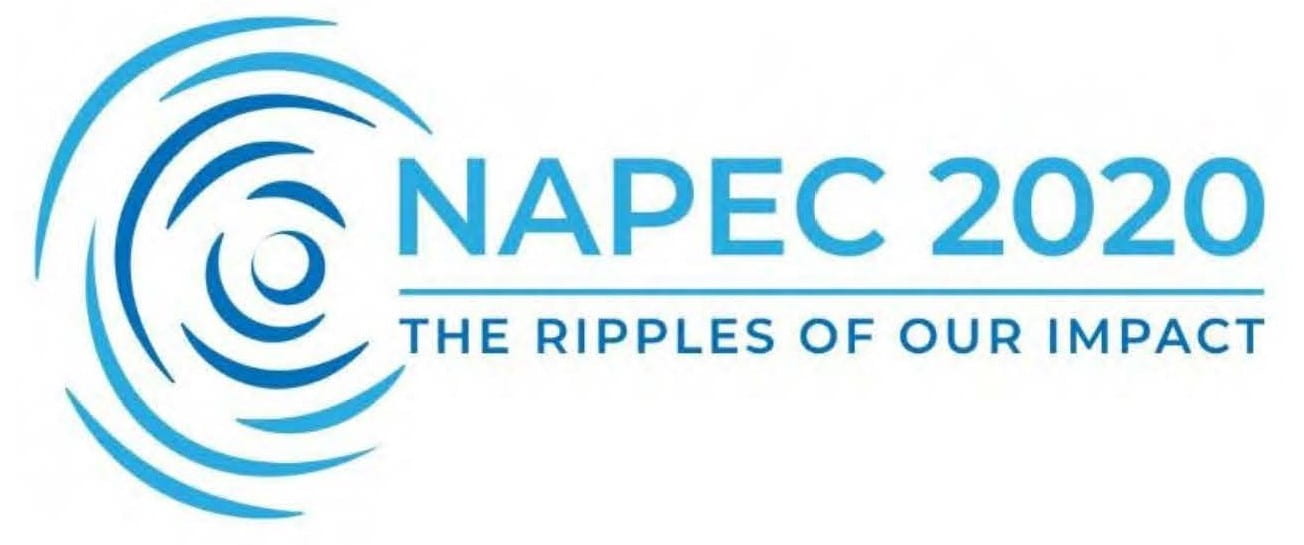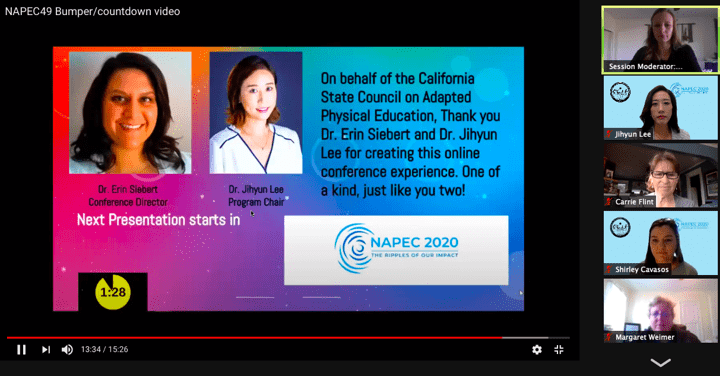By: Dr. Erin Siebert and Dr. Jihyun Lee
Dr. Erin Siebert (Conference Director) and Dr. Jihyun Lee (Program Director) from the Department of Kinesiology hosted the 49th National Adapted Physical Education Conference (NAPEC) online on November 13-14, 2020. The conference was marketed on various social media platforms as #NAPEC49online. This annual conference is presented by the California Alliance of Health, Physical Education, Recreation, and Dance (CAHPERD) and in coordination with the State Council on Adapted Physical Education (SCAPE). With the theme of “the Ripples of Our Impact,” this conference well represented the overarching emphasis on resilience. It was the first ever virtual conference since the organizations started hosting an annual conference back in 1971, originally called the National Conference on Physical Activity for the Exceptional Individual. Hosting a national conference takes a great deal of planning, energy, and work. However, administering the conference via a virtual platform for the first time during COVID-19 added a unique challenge.
Both Dr. Siebert and Dr. Lee responded well and were able to provide a most successful conference with over 300 attendees including a diverse group of presenters from across the country. Attendance at the conference exceeded the in-person attendance estimates they had originally been planning for, roughly 250 attendees. Presenters and attendees were adapted physical education (APE) teachers, physical education (PE) teachers, higher education professionals teaching adapted physical activity, APE and PE courses, as well as undergraduate and graduate students studying in the field. Many of the presentations at the conference provided information to attendees regarding how to teach APE at the university level as well as to children with disabilities in the public schools through online and various virtual platforms and legal issues regarding APE/PE remote learning. Also, many presentations showed the resilience of APE/PE professionals during these difficult times. For example, APE specialists in the Butte County Office of Education, which was selected as the NAPEC 2020 Program of the Year, presented some of their stories coming out of wildfire disasters in 2019, including how they continued APE services and helped children cope with the challenges they were facing even when the teachers themselves were dealing with the same situation. All presentations provided timely and valuable information to help those in the field continue to support children with disabilities and their families through quality APE/PE services during these challenging times.
Drs. Siebert and Lee utilized Zoom, YouTube, Adobe, and Google Workspace to make this conference possible. All sessions, keynote presentations, meetings, and socials were held via Zoom meetings and webinars. These sessions played recorded presentations held on the newly created NAPEC SCAPE YouTube channel. This was then followed by a live question and answer session moderated by two co-hosts. There was a break between each session where a countdown video played providing attendees with conference announcements, photos from previous conferences, and a save the date for next year’s 50th anniversary conference.
Zoom meetings were scheduled as rooms so that conference attendees could move from session to session much like they would at an in-person conference. This allowed for greater flexibility in the attendees’ schedule and the ability to view multiple presentations scheduled at the same time. Conference registration fees for attendees were kept to a minimum so that the information could be accessible to as many professionals and future professionals as possible given budget and travel restrictions in place due to COVID-19. What was even better was that after the conclusion of the conference, all of the recorded sessions were made publicly available on the YouTube channel to allow attendees and others not in attendance (e.g., parents of individuals with disabilities, special education teachers and directors, other APE professionals, etc.) to view and review any of the sessions.
Drs. Siebert and Lee received many positive feedback comments from conference attendees such as, “…I truly enjoyed the virtual conference experience! I was able to understand more with doing the virtual conference instead of in person conference due to my hearing impairment and with the use of subtitles/closed captioning has been so helpful! Thanks so much for the information and am looking forward to more future conferences!”, as well as from presenters who shared, “…that it isn’t an easy task – especially for you guys who had to be the pioneers for a virtual NAPEC. Well done, ladies! I am grateful to you for all you have done and will continue to do going forward.” Colleagues in the field of higher education said “I can certainly appreciate all the hard work that goes into administering the NAPEC, having attended the conference every year since 1988 and being responsible for helping to administer the conference on three separate occasions… I strongly believe that Dr. Siebert and Dr. Lee are the type of professionals who throughout their careers will remain committed to excellence and will continue to make strides toward contributing to the profession. They both represent the APE profession and San Jose (State University) well.”
Drs. Siebert and Lee would like to extend a special thank you to all the conference volunteers, moderators, presenters and attendees who put in the extra work to make this first ever-virtual conference not only possible but also a huge success.

